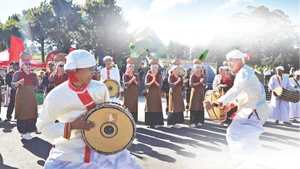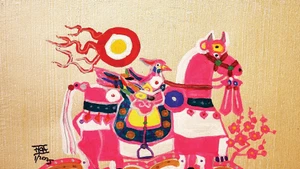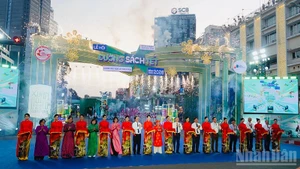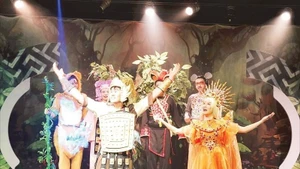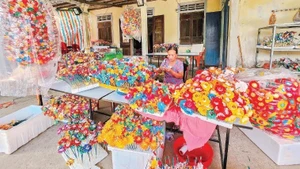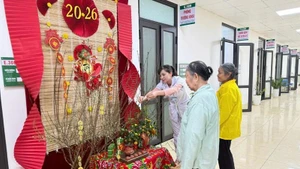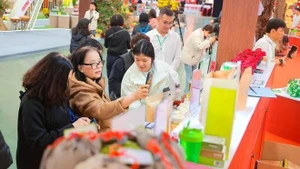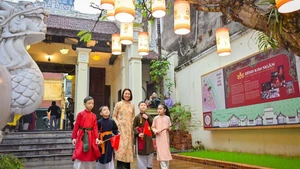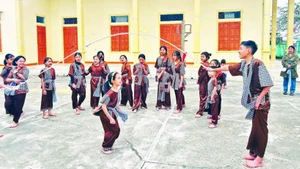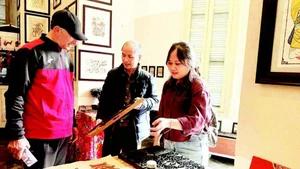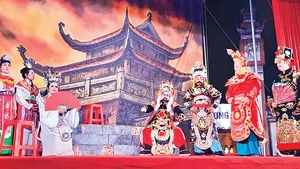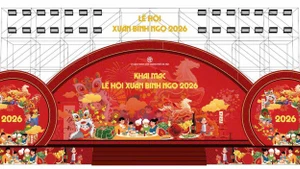In the early 1990s, Dao households who had long lived scattered across misty mountain slopes decided to move down. After surveying several locations, they chose Nam Dam, a more level area with arable land and a reliable water source, as their new settlement.
On this new land, the villagers worked diligently in farming and animal husbandry, and their living standards improved markedly. The hamlet’s proximity to the commune centre also meant children could attend school and adults had easier access to medical services. As a result, from only a few dozen households at the outset, the community has now grown to nearly 70 families.
What is most remarkable is the Dao people’s determination to preserve their traditional culture. Folk artisan Ly Dai Thong explained: “For us, traditional culture handed down by our ancestors is inseparable from the life of the Dao, passed from generation to generation. It cannot be abandoned. That is why customs, folk songs, traditional costumes, architecture, festivals and cuisine are still maintained.”
With this mindset, despite the changes in modern life, the villagers have remained consistent in preserving their traditional architecture. The earthen-walled houses with tiled roofs, built in the Dao’s typical style, not only embody cultural identity but also harmonise with the forested landscape. Ly Quoc Thang, one of the first households to offer homestay services, said: “These traditional earthen houses, set in the tranquillity of the mountains, are the first attraction for tourists. That is why every house here, whether renovated or newly built, is constructed in the traditional style.”
The Dao community’s distinctive culture is also reflected in its festivals, particularly the cấp sắc ceremony, an important rite marking a man’s coming of age. To preserve and promote this tradition, Ly Dai Thong established two folk performance groups: one comprising adults who regularly perform for tourists and take part in local rituals, and another of children to whom the cultural heritage is taught and passed down. “Every week, tourists request performances at the hamlet’s homestays. At each event, the group presents five acts from the cấp sắc ceremony. The ten members together receive about one million đồng, not counting extra gratuities from visitors,” Thong said.
Alongside the performances, tourists can also enjoy various cultural experiences closely linked to Dao daily life, such as traditional herbal baths, cooking with local families, farming, or joining in a fish-catching festival. As a result, every visitor to Nam Dam not only relaxes in the tranquillity of nature but also immerses themselves in the local culture, experiencing the community spirit and the warmth and hospitality of the people.
The preservation of cultural traditions has enabled Nam Dam to pursue sustainable community-based tourism. In 2013, Ly Quoc Thang and several other households pioneered tourism services. Initially, they simply renovated their homes and added bathrooms to accommodate guests. Today, 34 households run homestays, welcoming thousands of visitors from both home and abroad each year. In the first six months of 2025 alone, tourism revenue reached nearly 3 billion VND.
In addition to hosting visitors, the homestay households have actively worked to improve service quality, ensuring hygiene and food safety, learning basic communication with foreign guests, and promoting the hamlet’s tourism image on digital platforms. Thanks to these efforts, Nặm Đăm has developed tourism in a sustainable way and gained several distinctions. Notably, in 2017 it was awarded the title of “ASEAN Homestay Standard” and in 2023 won the ASEAN Community-Based Tourism Award.
Village head Ly Ta Danh said: “Visitors here do not simply come to find a place to stay; they come to live within the unique cultural space of the Dao people. Villagers have created many appealing experiences, from folk performances and herbal baths to farming activities and traditional dishes rich with the flavours of the mountains and forests.”

